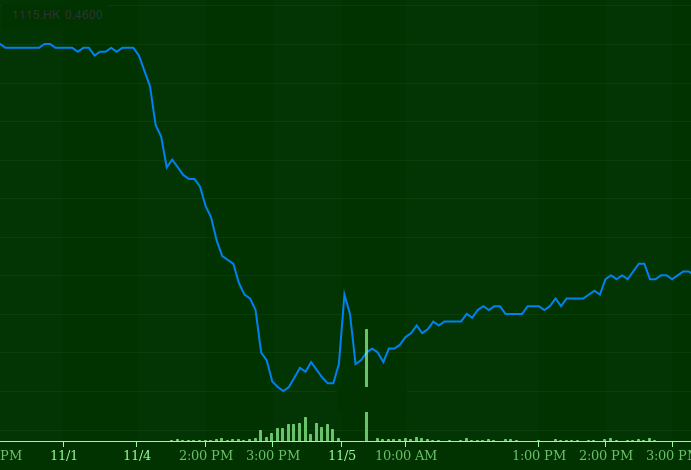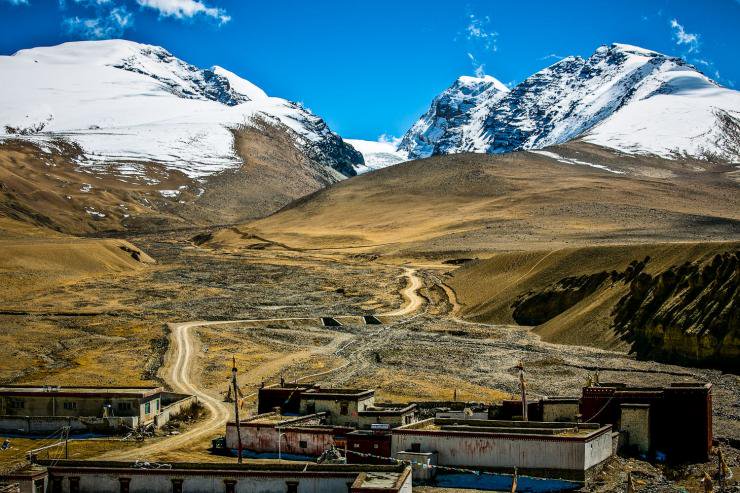Tibet water
« previous post | next post »
Ben Zimmer was just passing through Hong Kong Airport, where he got a bottle of Tibet 5100 spring water, complete with Tibetan script:
The Tibetan reads:
[Wylie:] Bod ljongs 'khyags rom gter chu
བོད་ལྗོངས་འཁྱགས་རོམ་གཏེར་ཆུ།
bod=Tibet
ljong=land
‘khyags rom= ice
gter=treasure
chu=water
“Water from the treasury of ice in the land of Tibet”
N.B.: So far as I know, since this is the only Tibetan on the bottle, it helps us understand that the exotic script is there simply as Tibetan-themed decoration, and that the labels are not genuinely bilingual. Sadly, although Tibetan, Mongolian, etc. are living languages read, written, and spoken by millions, they are often treated as exotic ornaments in materials where only the Chinese is actually meant to be read.
After buying the Tibet 5100 water, Ben had some misgivings when he read this:
"Tibet Spring Bottled Water: Status Symbol or Slippery Slope?", by China.new
Some recent economic developments regarding this pricey water make the story even murkier. The following notes come from Jichang Lulu, sent to me on November 5, 2019:
Tibet Water shares inexplicably dropped ~70% yesterday in HK:
Twitter comment by Muddy Waters, the ironically (for this post) named investigative research firm headed by Carson Block, who is known for "documenting and alleging fraudulent accounting practices in publicly traded Chinese companies":
Feels like the end of an era with Tibet Water $1115.HK imploding yesterday on no news. Watched it for 6+ yrs, knowing it's a scam – a money laundromat 4 CN Ministry of Railways. Never went short b/c that'd be betting AGAINST corruption in China. Would love to know what happened
Comments mention disclosure of high-speed railway losses, but those were known to be largely unprofitable. Be what may, I was reminded of a more general issue.
Tibet Water is only one of the Chinese brands of bottled water that exploit the pristineness of Tibet. To those more aware of the relevant politics and history, these water bottles (often given away for free to high-speed train passengers) are in fact a reminder that the exploitation of Tibet's natural resources is largely done to serve the CCP's Leninist capitalism at the expense of the majority of the Tibetans. On this topic, Gabriel Lafitte's Rukor རུ་སྐོར་ project has documented several notorious cases of ‘nature vs the Tibetans’ hypocrisy, notably the ‘Death by UNESCO’ situation seen in Hoh Xil ᠬᠥᠬᠡ ᠰᠢᠯᠢ Хөхшил 可可西里 / Achen Ganggyap ཨ་ཆེན་གངས་རྒྱབ་in Amdo / Qinghai (see here and here).
Three years ago I had an exchange with the noted Tibetologist Dan Yerushalmi aka Dan Martin, who wrote an interesting blog post on another, relatively minor brand, whose name was translated as ‘Tibetan Magic Water’.
“Magic Water?”, Tibeto-Logic, 8 Sep '16
My own post on the matter “Kalendis Octobribus [i.e., ‘on National Day / 国庆节’]: Tibetan magic water” summarised his before looking into the history of the company and the relevant temple (which took me a while to geolocate).
At Tibeto-Logic, Dan Yerushalmi (aka Dan Martin) recalls being laughed at outside Drepung Monastery for drinking Xizang shenshui 西藏神水 mineral water. The bottle translates its brand as ‘Tibet Magic Water’ in English, but the hilarity ostensibly came from the Tibetan: བོད་ཀྱི་ལྷ་ཆུ་མཆོད་རྟེན་ཉི་མ། bod kyi lha chu mchod rten nyi ma. Dan relapsed into “the kind of a cowed smile you smile when you have no real clue what the laughter is all about”.
The first half of the Tibetan name means the same as the Chinese brand, ‘Tibetan divine water’. The second half, as Dan realised decades later, refers to Chorten Nyima, a holy site in Gampa Town (གམ་པ་གྲོང་རྡལ། gam pa grong rdal, 岗巴镇), Gampa County (གམ་པ་རྫོང། gam pa rdzong, 岗巴县), Shigatse Prefecture, whose water can wash away the worst sins, down to and including incest. That’s the water Dan was drinking, which presumably explains the hilarity.
The relevant point is that the product's branding and the company's background clearly point to a non-Tibetan, primarily Han target customer base, to the extent that no one stopped to think at least some Tibetans would associate drinking such water with having heinous sins to atone for.
The poles are similarly marketed to Chinese consumers. It would be prolix to recapitulate here the story about the purportedly pH 8.88 water from Iceland sold by a peculiar Chinese businessman, so here's a link for those interested.
Oh, dear lord, may the holy waters wash away my sins!
Selected readings
- "Tangut beer" (10/13/18)
- "Uyghur as ornament" (9/19/13)
- "Gibberish Tibetan" (10/6/16)
[Thanks to Douglas Duckworth]





Bathrobe said,
December 1, 2019 @ 11:59 pm
This is pretty blatant "cultural appropriation". While some hyphenated Americans, including Chinese-Americans are highly affronted by "cultural appropriation" in the US, the irony is that the (Han) Chinese are among the most egregious cultural appropriators of all time, as long as there is a buck to be made. I wonder sometimes why hyphenated Americans don't come down harder on Han Chinese "back home". Perhaps it's easier being the oppressed than the oppressor.
John Swindle said,
December 2, 2019 @ 4:20 am
As a German-American, an English-American, a Scottish-American, a Norwegian-American, and, by DNA, according to 23andMe, an Irish-American, Russian-American, Central-Asian-American, Broadly-Southern-European-American, Ashkenazi-Jewish-American, and so on, I hereby forbid folks back home appropriating each others' cultures. Now what?
brian said,
December 2, 2019 @ 6:10 am
The label does one thing I wish more labels do: indicate the year/month/day order of the expiry date (yyyy/mm/dd.)
Bathrobe said,
December 2, 2019 @ 7:54 pm
@John Swindle
Heh! As long as you don't claim ownership of German, English, Scottish, Norwegian, Irish, Russian, Central Asian, Broadly Southern European, and Ashkenazi Jewish culture, I shouldn't think you would have much to say about "folks back home". If, on the other hand, you claim they belong to you personally and are not for the use of others, maybe you do need to think about exactly what parts of "your ancestral culture" you are laying claim to.
Victor Mair said,
December 2, 2019 @ 8:21 pm
Desultory renderings and notes from Tibetologist colleagues:
1.
"Tibet/ glacier/ treasure water".
2.
Literally "Tibet-land glacial treasure-water"
3.
Literally "Tibet glacier mineral water".
4.
I think gter ma means just ‘mineral water’, although I can't tell if it's the only or the most common term. Although gter does mean treasure (e.g. gter ma = terma, ‘hidden treasures’, hidden teachings in Tibetan Buddhism), it's also part of several words related to mines and minerals.
SusanC said,
December 3, 2019 @ 7:00 am
There are several possible sources of humour here (re. The monks' laughter).
The first is the danger of -as a foreigner- displaying slogans in a langage you don't fully understand. Your t shirt (or bottled water etc.) might say something embarassing
The second is the way in which topics of former high seriousness (e.g. Religious pennance for incest) have, in our modern world, been degraded into mere means of selling us stuff, such as bottled water.
——–
As someone who knows only a little Tibetan (from seeing its use in Buddhist philosophical works), the frequent use of metaphor (e.g. As seen here, gter ma) makes it especially treacherous for an outsider to know what is really meant.
Add to that the frequent occurence of antinomian imagery in Vajrayana: is something not taboo, or is it being referenced in ritual because it is taboo? Plenty of scope for outsiders to be confused.
John Swindle said,
December 4, 2019 @ 2:22 am
@Bathrobe: As long as they don't borrow words, I guess.
Bathrobe said,
December 7, 2019 @ 7:25 am
Words are the least problematic part of "cultural appropriation".
I'm not sure what part of my point you were taking exception to.
I was referring to the claim of some hyphenated Americans to "ownership" of the old country's culture, when the culture they lay claim to is fairly blatant in its own cultural appropriation.
Which part do you find objectionable? The implication that some militant hyphenated Americans are peculiarly American in their obsession, with only a tenuous link to the actual culture of the old country, or the claim that the Han Chinese are cultural appropriators par excellence? If you feel that either party has been falsely portrayed, please let me know.
Cerberus said,
December 13, 2019 @ 8:09 pm
@Bathrobe is it so difficult to understand that the groups criticizing cultural appropriation aren't the groups engaged in it, even if they just so happen to share a similar ethnic label? It is rather presumptuous to suggest that Chinese Americans need to call out the behavior of Chinese in China when they aren't directly affected by the actions of Chinese in China, but are directly affected by the behavior of Americans in America. It's like saying that American Jews cannot remember the Holocaust without condemning Israel's treatment of Palestinians.